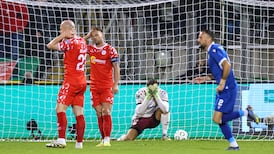Westmeath footballer Luke Loughlin has told the Oireachtas Joint Committee on Drugs Use about being “blinded by my addiction” and unable “to see the damage I was doing” until eventually seeking help from the Gaelic Players Association (GPA).
Loughlin was 14 when he had his first drink, 16 when he first tried pills and cocaine, and was among several representatives at Thursday’s meeting in Leinster House to openly discuss the subject of addiction, sports and wellbeing – and a pathway to support sporting bodies providing rehabilitation services.
The 30-year-old was frank about his own experiences and recovery from alcohol and substance abuse, a time when “sport always seemed to be the only release where I felt good about myself without having to drink or take drugs”. He also addressed last month’s GPA survey where 20 per cent of male players said, “they were aware of a team-mate who has struggled because of drug misuse”.
Loughlin was recently named on the Tailteann Cup Team of the Year, and co-captained his club The Downs to the Westmeath senior football title, kicking seven points. Just four years ago, his addiction came close to ruining his football career and his life.
READ MORE
“From birth I have had no relationship with my biological father,” he said. “As a 30-year-old man this sentence doesn’t carry any weight or leave any marks but as a child I always felt I was missing something. I struggled in my childhood and more so in my teens with the feelings, of trust, abandonment, not being good enough and constantly looking for validation or attention. Ultimately, I could never be myself.
“At the age of 14 I tried alcohol for the first time with my friends and the feeling that it gave me, it gave me confidence, allowed me to be someone else and was able to take me out of own head ... For the next few years my behaviour continued to get worse. I left school at 16. I was out drinking and gambling most weekends and started to experiment with drugs such as pills and cocaine.
“As the years went by, I spiralled out of control, I wrote off two cars (lucky to be alive and to have not hurt someone else), could not hold down a job, and was dropped from the Westmeath panel numerous times.”
Only after a final intervention by his mother in 2021 did Loughlin seek help, the GPA securing him a place in the Cuan Mhuire treatment centre in Athy. Loughlin now works as a Games Promotion Officer for the GAA, and is also active in talks and workshops on alcohol and substance abuse.
“In treatment I was able to fully focus on myself, without any outside distractions,” he said. “To be able to talk about your problems without judgment and have someone who understands listen and help you see things in a different way is ultimately what helped me to change.”
The Joint Committee on Drugs Use is made up of 14 members; nine from the Dáil, five from the Seanad. Fine Gael senator Evanne Ní Chuilinn asked Loughlin if his experiences reflected the anecdotal evidence that recreational drug use was increasing among the GAA players.
“I’m probably a bit removed from that situation,” said Loughlin, “but there definitely is a problem, probably more so in clubs, with recreational drug use. I think the problem is the build-up to a final, or the let-down after a final, I think, because they might stay off the drink or whatever for while, I think that’s where the problem comes in.
“So I don’t think it’s an individual thing, I think it can be down to the collective, and I don’t think you can blame one person for that.”
In last month’s annual GPA member survey, of the 3,676 players who responded, 20 per cent of male players stated their awareness of a team-mate “who has struggled because of drug misuse”. The GPA’s head of player development and Wellbeing, Jennifer Rogers, told Fianna Fáil senator Mary Fitzpatrick that while these percentages didn’t necessarily mark an increase in the problem, early intervention was becoming increasingly critical.
“For us, from a data perspective, we’re not seeing an increase,” she said. “There was an ERSI report published in 2019 where 77 per cent of intercounty players felt that their team-mates didn’t engage in illicit drug use, or any drug use.
“And we did a recent survey where we found that 20 per cent of players were engaged in recreational drugs.
“But in terms of the crisis support, we’re very lucky that we’re able to provide those for players in terms of residential care and counselling. But where we see the issue is early intervention and prevention, and raising awareness among young people that this isn’t a healthy behaviour in terms of coping with the stress and the demands and the struggles that all of us experience through life.”
Loughlin also said his success on the field in some ways helped facilitate his addiction: “I happened to be quite talented at sport, and that probably [helped me get away with] a lot more. Even when I was acting out, the club were probably like ‘this lad is going to be able to help us’. And the older I got, I probably never faced any consequences for my actions, so subconsciously I kept going until the penny finally dropped.”
Sport Ireland Director of Participation, Ethics, Integrity and Research Mary Van Lieshout also spoke of the relationship between the social aspect of sport and the consumption of recreational drugs and alcohol.
“There is a need for integrated national strategies that promote the positive aspects of sport and could address potential links to early alcohol initiation,” she said.














